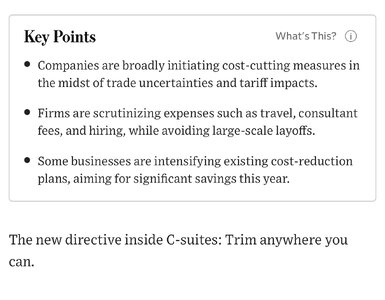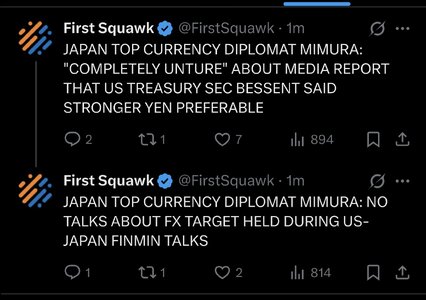Navigation
Install the app
How to install the app on iOS
Follow along with the video below to see how to install our site as a web app on your home screen.
Note: This feature may not be available in some browsers.
More options
You are using an out of date browser. It may not display this or other websites correctly.
You should upgrade or use an alternative browser.
You should upgrade or use an alternative browser.
Tariffs Catch-All
- Thread starter BubbaOtis
- Start date
- Replies: 5K
- Views: 178K
- Politics
- Messages
- 8,307
Such a lie.
And if the tariffs do as he says and brings manufacturing and jobs back to the US, then the imports should decrease, therefore the tariffs revenue would decrease.
- Messages
- 8,307
It's the shell game.Especially since tariffs are taxes. Kinda miraculous.
- Messages
- 41,588
America Inc. Slashes Spending as Tariff Uncertainty Swirls
CEOs pause travel, delay construction projects and slow hiring in response to tariffs and cloudy economic forecasts

lawtig02
Legend of ZZL
- Messages
- 5,905
- Messages
- 4,126
What's the longest Trump has ever talked without telling an enormous lie?
Liars v Liars — He Said, Xi Said
If my life depended upon picking who is telling the truth, it's a no brainer...XI
- Messages
- 41,588
I cannot claim any credit
- Messages
- 523
Never! Never is the answer.... right?What's the longest Trump has ever talked without telling an enormous lie?
- Messages
- 41,588
“Britain and the European Union are set to sign a formal declaration committing to “free and open trade” in defiance of Donald Trump’s tariff agenda.
A leaked draft seen by POLITICO promises a “new strategic partnership” between London and Brussels based on “maintaining global economic stability and our mutual commitment to free and open trade.”
It comes as Keir Starmer’s U.K. government is locked in negotiations with the Trump administration to try to get a carve-out from the U.S. president’s new tariffs.
…
The May 19 summit will be hosted by the U.K. and is expected to be the next major milestone in Starmer's bid to overhaul relations with the EU — which were often stormy under his Tory predecessors.
The meeting is expected to be used to fire the starting gun on a wider range of negotiations covering topics like eliminating some border checks on agri-foods, a youth mobility visa scheme, and the linkage of the British and European emissions trading schemes. “
The ports at Seattle and LA are already almost empty:

 fortune.com
fortune.com

Huge decline at L.A. port is a hit to truckers—and a stark warning of coming tariff damage
Los Angeles is already experiencing a huge drop-off, and truckers in other cities will soon be hit, too.
- Messages
- 2,395
“Britain and the European Union are set to sign a formal declaration committing to “free and open trade” in defiance of Donald Trump’s tariff agenda.
A leaked draft seen by POLITICO promises a “new strategic partnership” between London and Brussels based on “maintaining global economic stability and our mutual commitment to free and open trade.”
It comes as Keir Starmer’s U.K. government is locked in negotiations with the Trump administration to try to get a carve-out from the U.S. president’s new tariffs.
…
The May 19 summit will be hosted by the U.K. and is expected to be the next major milestone in Starmer's bid to overhaul relations with the EU — which were often stormy under his Tory predecessors.
The meeting is expected to be used to fire the starting gun on a wider range of negotiations covering topics like eliminating some border checks on agri-foods, a youth mobility visa scheme, and the linkage of the British and European emissions trading schemes. “
So...unBrexit?
Mulberry Heel
Inconceivable Member
- Messages
- 4,000
Dear Leader won't like that when he sees it, and he will see it, as he apparently watches television and surfs social media 24/7 looking to see what's being said about him, and by whom, like the true narcissist that he is. Bessent will likely be apologizing to Dear Leader and kissing his ass for awhile.Bessent keeps going off script.
Mulberry Heel
Inconceivable Member
- Messages
- 4,000
Because most of it is now owned by Trumper billionaires or they've been cowed into submission. The right wing takeover of our legacy media and social media is largely complete. Well, that and the Trump White House has fixed WH press conferences so that pretty much the only people who can ask questions anymore are Trump-friendly media sources and Trump flunky reporters. The questions asked at some WH press conferences since January have been downright embarrassing.Obvious lies, but the press doesn't challenge him on that.
Last edited:
Mulberry Heel
Inconceivable Member
- Messages
- 4,000
I think he does believe it, or has probably convinced himself that his own lies are true. He's an idiot who - despite the myth that he's a great businessman - doesn't understand shit about economics or business. He's spent his life as a celebrity reality show star who hires other, smarter, people to actually run his business interests, and even then he's declared bankruptcy six times. It wouldn't surprise me at all if he's convinced himself that his beautiful tariffs will make us wealthier than ever and can do exactly what he says. His wealth and fame have allowed him to live in his own little reality for so long he likely has no connection to the way things really work anymore.I wonder if he is lying about tariffs and taxes?
He’s poorly educated and extremely poorly read since his lackluster college career.
He’s likely in some stage of dementia.
No one tells him the emperor has no clothes.
He might believe the BS he spewed in that clip.
Share:




